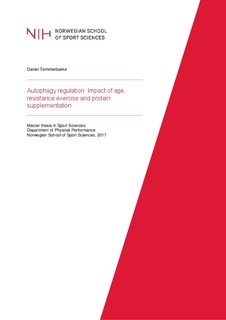Autophagy regulation: impact of age, resistance exercise and protein supplementation
Master thesis
Permanent lenke
http://hdl.handle.net/11250/2450761Utgivelsesdato
2017Metadata
Vis full innførselSamlinger
Sammendrag
Background: Aging is associated with a decline in skeletal muscle mass, strength, and quality a condition known as sarcopenia, which further relates to the loss of functional independence. The pathways regulating protein degradation via autophagy have displayed age-related reductions, reflecting insufficient clearance of damaged proteins and organelles, compromising the function of the cell and ultimately contributing to the development of sarcopenia. The purpose of this thesis was therefore to examine markers of protein degradation via the autophagy-lysosome system in young, healthy elderly and frail elderly and investigate how they respond to acute resistance exercise and protein supplementation. Methods: Twenty-nine men and women were divided into three different age groups; Young (n = 7, 20-43 years old), elderly (n = 10, 70-82 years old) and frail elderly (n = 12, 67-96 years old). The groups performed either a whole-body resistance exercise (young and elderly) or lower body resistance exercise bout (frail elderly), followed by protein supplementation. Muscle biopsies were obtained from m. vastus lateralis before and after the resistance exercise bout and protein intake. Muscle tissue samples were fractionated into cytosol and membrane fractions and analyzed for LC3, p62 and Foxo3a.
Beskrivelse
Masteroppgave - Norges idrettshøgskole, 2017
